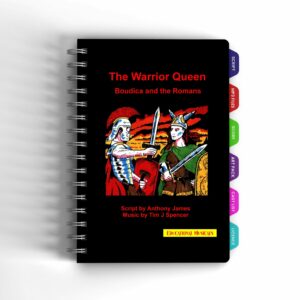
Boudica was a reluctant soldier who, until the Romans invaded England, was happily married to King Prasutagus, ruler of the Celtic tribe Iceni.
Then to keep the peace, King Prasutagus agreed with the Romans that on his death half his lands and estates would go to his wife and daughters, with the other half going to the Romans. Unfortunately, by the time he died Nero was the Roman Emperor, and he didn’t honour the agreement. Instead, he had her two daughters violated, and Boudica publicly beaten by Roman soldiers. He then started on the other tribal Chiefs, beating them and stripping them of their lands and belongings.
Boudica didn’t like this.
In fact, she was mad, she intended to make them pay, she joined with the other tribes to lead them against the Romans. She had a huge army and she started with the Roman capital of Camulodunum (Colchester) as the Romans had driven the inhabitants from their houses and lands to build a large temple.
Not a good idea!
So, therefore, to get her own back she burnt the temple to the ground.
The Romans sent an army to protect the town, which she then defeated.
You know what they say about a lady scorned? Well, it’s true and the Romans learnt the consequences!
Then she moved towards London. Suetonius, the Commander, knowing he couldn’t defend the city, left it to gather an army.
She went on to attack Verulamium, (St Albans to you and I). Tacitus, a Roman historian, reported “No less than seventy thousand citizens and allies were slain”.
How did they stop her?
Finally, Suetonius got together his army of 10,000 trained Roman legionnaires, who then faced Boudica’s 80,000 strong army. Unfortunately, an army of 80,000 untrained Celts were no match for the well-trained Roman legionnaires.
Tacitus, the Roman historian, described it:
“as a glorious victory, fit to rank with those of olden days.
Some say that a little less than eighty thousand Britons fell,
our own killed being about four hundred,
with a larger number wounded”.
What happened to Boudica?
All this was too much for Boudica, she also knew what would happen to her if she fell into the hands of the Romans, so she drank her own poison and died.
That is what happened when the Romans came across a woman scorned!

We have a musical for your student The Warrior Queen – Boudica and The Romans, which you can download at https://www.history-portal.com/product/the-warrior-queen/.
A Celtic storyteller and a Roman historian recount the story of the Warrior Queen, Boudica, who leads a revolt against the Romans, destroying three cities. After a great battle her army is destroyed and to avoid capture she takes poison. This show gives an insight into the worlds of both the Celtic natives and the Roman invaders while chronicling the clash of two very different cultures.
Isn’t history fun?
10 questions to discuss:
- How did the betrayal of the Romans towards Prasutagus and Boudica spark a wider rebellion among the Celtic tribes?
- Analyze the strategic choices made by Boudica, focusing on her initial victories and eventual defeat.
- Compare the military strengths and weaknesses of the Celtic and Roman forces during the rebellion.
- Evaluate the historical sources about Boudica, considering the potential biases of Roman historians like Tacitus.
- Explore the legacy of Boudica as a symbol of resistance against oppression, both in her own time and throughout history.
- Discuss the social and political conditions in Roman-occupied Britain that contributed to the outbreak of Boudica’s rebellion.
- Imagine you are a citizen caught in the midst of the rebellion. What choices would you make and how would the conflict impact your life?
- Compare Boudica’s rebellion to other historical uprisings led by women, such as those of Jeanne d’Arc or Rani Lakshmibai.
- Reflect on the ethical implications of warfare, considering the brutality described in the text from both sides.
- In your opinion, what are the key lessons to be learned from Boudica’s story and its portrayal in history?
These questions encourage critical thinking, analysis, and personal reflection beyond simply summarizing the narrative. They delve into the context, motivations, strategies, consequences, and broader significance of Boudica’s rebellion, prompting deeper understanding and connection to historical events.
For more information on Boudica go to:
© Tony Dalton

